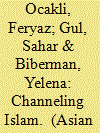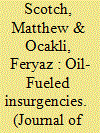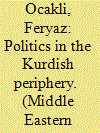| Srl | Item |
| 1 |
ID:
148944


|
|
|
|
|
| Summary/Abstract |
Pakistan's religious television programs have drawn significant attention in both academic and policy circles. However, there has been surprisingly little systematic analysis of their content and influence. This article shows that, although the televangelists featured on the Pakistani television channels present some of the most conservative views regarding the role of women and religious minorities in society and the role of Islam in governance, Pakistani television is an arena of contestation. The impact of the lively debates between televangelists on young viewers—over whom the ideological battles are being waged—is mixed. Findings from an original survey of Pakistani students and political activists suggest that young people in Pakistan watch religious shows only occasionally. Those that do, however, take them seriously. What leads young people to consume religion on television is a sense of social responsibility: that they are doing it not just for themselves, but also—and perhaps more importantly—for others, be it their families or communities.
|
|
|
|
|
|
|
|
|
|
|
|
|
|
|
|
| 2 |
ID:
152713


|
|
|
|
|
| Summary/Abstract |
What makes oil a lootable resource? We explore the conditions under which oil rents accrue to violent nonstate actors by disaggregating the oil supply chain. We argue that territorial control by states and insurgent groups shapes how oil is looted. It is more likely to be looted at the extraction and refinement phases in insurgent-controlled zones. In zones that are contested between the state and insurgents, oil is more likely to be looted at the transportation phase. Oil looting is rare in state-controlled zones, but never fully eradicated. Corporate and government corruption reduces risk for looters and enables the expansion of theft operations. We explore these arguments with a comparative analysis of the Islamic State in Iraq and Syria and the Movement for the Emancipation of the Niger Delta in Nigeria.
|
|
|
|
|
|
|
|
|
|
|
|
|
|
|
|
| 3 |
ID:
152604


|
|
|
|
|
| Summary/Abstract |
Despite the return to violence and state repression in the Kurdish conflict, the ruling Adalet ve Kalkınma Partisi (Justice and Development Party – AKP) has remained the only alternative to the Kurdish National Movement (KNM) for Turkey's Kurdish citizens. What local-level strategies did the AKP employ in Kurdish areas to reinforce its national-level appeal to Islamic values? Under what conditions did local vote-seeking strategies help the AKP to overcome its pro-Kurdish rivals at the ballot box? This article examines the politics of local coalition building in the periphery of the Kurdish landscape – Bingöl and Muş. Despite their many similarities, the two cities voted for different political parties in national elections. This article examines how the AKP's local party organizations interacted with local authority structures, recruited influential local elites, and pursued new voters. The vitality of clan networks in parts of Bingöl enabled the AKP to build a reliable local coalition. The gradual weakening of clan networks in Muş and their permeation by the KNM prevented a similar coalition. Instead, the parties of the KNM were able to take advantage of divided clan networks to win national electoral contests in the province.
|
|
|
|
|
|
|
|
|
|
|
|
|
|
|
|